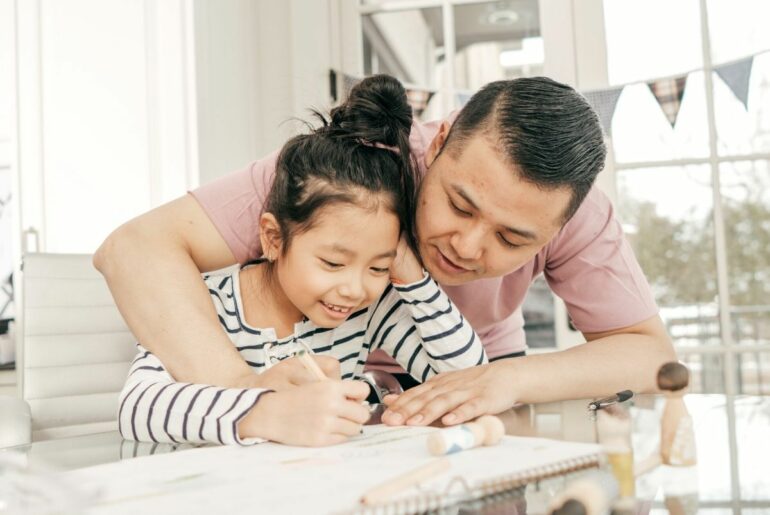Through the generations, parenting styles have varied widely in regards to how much freedom children have been granted. Parents are faced with daily, complex decisions in which they have to weigh their children’s independence and autonomy against their safety and wellbeing. Sometimes, in order to protect their kids, parents may overstep important boundaries—perhaps by snooping or sharing private information online.
“Mindful meddling” is a concept developed by Dr. Sarah Levin Allen, executive director of Brain Behavior Bridge and author of Raising Brains: Mindful Meddling to Raise Successful, Happy, Connected Kids. Dr. Allen developed the concept of “mindful meddling” to provide a template for parents looking to strike the proper balance between protecting their kids and letting them figure things out for themselves.
Here are the four things you should keep in mind when your kid finds themselves in a tough situation, and you’re trying to decide exactly how involved you should get.
Be intentional
It’s natural for parents to want to step in and fix things for their kids. It can be hard to watch them struggle. According to Dr. Allen, “We need to create more times we’re actually looking out for the best interests of the other person involved and not just on an impulse of wanting to get in there and fix things.”
The end-goal should be to help kids develop the skills to solve their own problems. For example, if your child is struggling with an assignment in school, rather than contacting the teacher yourself, the more mindful approach would be to talk through some strategies with your kid for getting the help they need on their own.
Consider their developmental goals
Children are constantly working towards developmental milestones. While your six-year-old might be working on developing friendships, your toddler may still be learning how to use their words. Understanding their goals can help you decide how to respond in a hard parenting moment.
As Dr. Allen puts it, “Once you know what your kids are working on, you can do this mindful meddling a lot easier, because the idea is that you want to step back when it’s a goal that your child is working on.” Your response should be guided by what your child needs at that point in their development.
For example, if your toddler is frustrated and acting out because they aren’t able to ask for what they want, you could respond by encouraging some deep breaths and then offering some words they can use to express what they’re feeling. Or, if an older child who’s working on developing friendships gets in a disagreement about sharing during a playdate, talk through options for the best next step with them (whether that’s apologizing for hurt feelings, setting a timer for taking turns, or switching to another activity) instead of stepping in to be the one who decides what happens next. Guiding them in this way helps them develop the skills they need to reach their developmental goals.
Focus on their feelings
Allen urges parents to guide rather than direct their kids through problems. Decide how to help based on what will teach them the most in the situation. A common example of parental meddling is in the context of their kids’ friendships.
If there’s a conflict, it can be tempting to jump in and make quick judgments and decisions about the other people involved, especially someone who may have hurt or upset your child. Instead of trying to micromanage your kid’s friendships or relationships, try asking them some questions about how their friends make them feel. Giving them the space and language to talk about how they’re affected by their different relationships will empower them to make good social choices on their own.
As Dr. Allen puts it, “You want them thinking about these relationships themselves because they’re not going to tell you everything [when they get older]. You want them to hear your voice in their head, because you can’t always be there. If you’re not teaching—if you’re not mindfully meddling, and instead you’re directively meddling—you’re going to run into problems, because they’re not going to have the skills [they] built themselves … to manage their own relationships in the future.”
Set and respect boundaries
Awareness and concern about child and adolescent mental health has been on the rise in recent years. During the pandemic, the number of kids struggling with mental health issues rose sharply, prompting a new sense of urgency about protecting kids’ mental and emotional wellbeing.
Increasingly, parents are taking to social media for support and advice regarding their kids. With more and more parenting groups and advice accounts popping up, and the pandemic pushing many folks to spend more time online, public online forums are becoming a go-to resource for parents with difficult questions.
As helpful as it can be to have easy access to like-minded parents for second opinions, it’s worth remembering that it can be a violation of privacy to share personal information about someone in a public forum. As tempting as it can be to share what’s going on with your child during a tough time, take a moment to think about how sharing those details may affect the trust between you.
With some healthy boundaries and a focus on consent, parents can work with their kids to find solutions to their problems. If you need advice, think about some trusted peers or experts you’d be able to reach out to one-on-one when you’re feeling stuck.
Parenting is full of problem-solving and tough choices. It’s so important to think about how these choices affect everyone in the family. Modelling respectful and thoughtful problem-solving as a family team will give your children the blueprint for getting through hard moments on their own in the future.






